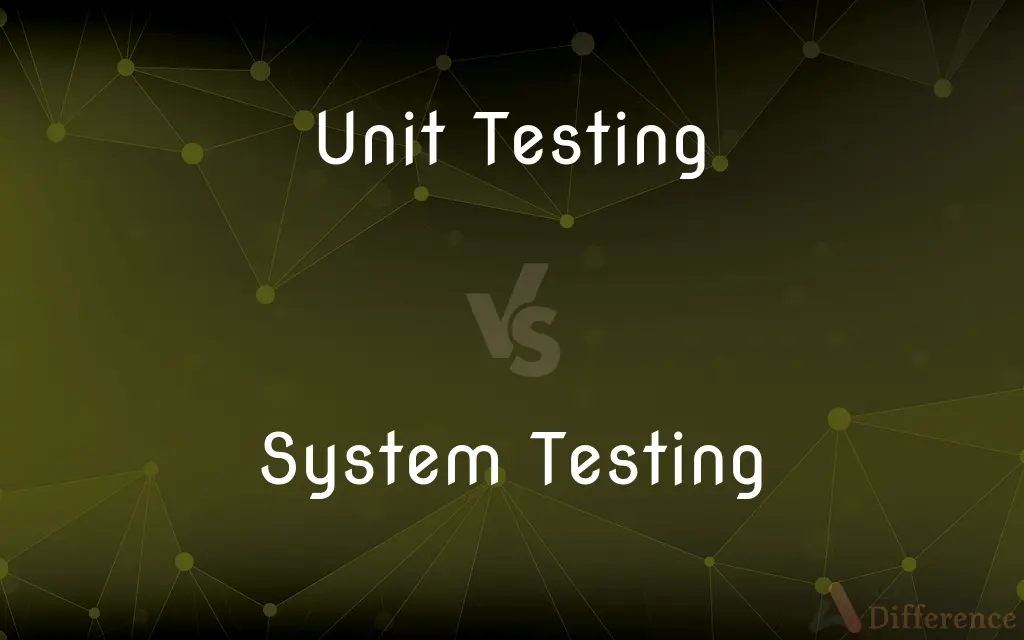Unit Testing vs. System Testing — What's the Difference?
By Tayyaba Rehman — Published on January 4, 2024
Unit Testing focuses on individual components, whereas System Testing evaluates the entire system's functionality.

Difference Between Unit Testing and System Testing
Table of Contents
ADVERTISEMENT
Key Differences
Unit Testing involves testing individual components or units of code for functionality, typically done by developers. System Testing, on the other hand, is a high-level test covering the entire system's functionality.
In Unit Testing, the focus is on the correctness of isolated code segments, often using mock objects. System Testing evaluates end-to-end specifications, often in an environment that mimics production.
Unit Testing is usually the first step in the testing process, aiming to catch bugs early. System Testing is conducted later, ensuring the integrated system meets the required needs.
Unit Testing typically requires detailed knowledge of the internal program design and code. Conversely, System Testing is often performed from the user's perspective, requiring no in-depth knowledge of the code.
Unit Testing can be performed frequently during development, offering immediate feedback. System Testing, being more comprehensive, is less frequent and often performed after significant milestones or at the end of the development cycle.
ADVERTISEMENT
Comparison Chart
Scope
Individual components or units
Entire integrated system
Purpose
Ensure that each unit functions correctly
Validate the system's overall functionality
Performed By
Developers
Testers or QA specialists
When Performed
Early in development, frequently
After integration, closer to release
Requires Knowledge Of
Internal code and program design
User requirements and system specifications
Compare with Definitions
Unit Testing
Testing of individual software components.
A developer performs unit testing on a new class to ensure it functions as expected.
System Testing
Verifies the complete and integrated software.
System testing ensured the new software release met all functional requirements.
Unit Testing
Often automated for efficiency.
Automated unit tests run every time a change is made to the codebase.
System Testing
Ensures compliance with requirements.
System testing is performed to verify that the software meets all specified criteria.
Unit Testing
Involves isolating a section of code.
Isolating a function in unit testing to verify its independent functionality.
System Testing
Covers both functional and non-functional aspects.
System testing checked not only features but also performance under load.
Unit Testing
Helps identify bugs at an early stage.
Unit testing a module caught a calculation error before integration.
System Testing
Involves testing the entire system's functionality.
Before launch, system testing is conducted to check end-to-end workflow.
Unit Testing
A method to validate each piece of code.
After adding a new method, unit testing verifies its correctness.
System Testing
Often the final testing phase.
After passing system testing, the software was deemed ready for deployment.
Common Curiosities
Who conducts System Testing?
Testers or Quality Assurance specialists.
What is Unit Testing?
Testing individual components or units of code in isolation.
What is System Testing?
Testing the entire integrated system to validate overall functionality.
Is Unit Testing dependent on external systems?
No, it's typically isolated from external dependencies.
Who typically performs Unit Testing?
Developers, as part of the coding process.
What aspects does System Testing cover?
Both functional and non-functional requirements.
Are mock objects used in Unit Testing?
Yes, to simulate external dependencies.
Is System Testing done after Unit Testing?
Yes, it generally follows after unit and integration testing.
Does System Testing include stress testing?
Yes, it can include stress and load testing.
What's the benefit of System Testing?
Ensures that the entire system works as intended.
What does Unit Testing aim to identify?
Bugs or issues within individual units of code.
Can Unit Testing be automated?
Yes, it's frequently automated for efficiency.
Is System Testing more comprehensive than Unit Testing?
Yes, it's broader, covering the integrated system.
Does Unit Testing require knowledge of the system's design?
It requires knowledge of internal program design.
Is System Testing done in a real-world environment?
Often in an environment that mimics production.
Share Your Discovery

Previous Comparison
Chilli Powder vs. Ancho Chilli Powder
Next Comparison
Physical Digestion vs. Chemical DigestionAuthor Spotlight
Written by
Tayyaba RehmanTayyaba Rehman is a distinguished writer, currently serving as a primary contributor to askdifference.com. As a researcher in semantics and etymology, Tayyaba's passion for the complexity of languages and their distinctions has found a perfect home on the platform. Tayyaba delves into the intricacies of language, distinguishing between commonly confused words and phrases, thereby providing clarity for readers worldwide.











































